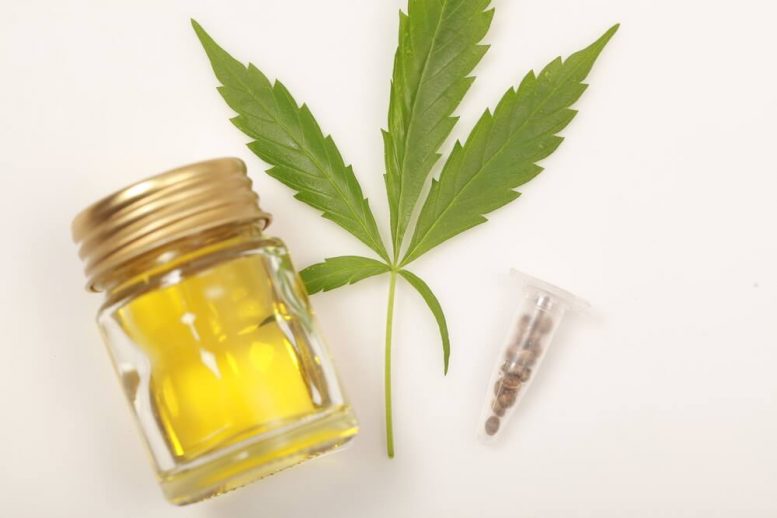You are here
Home 🌿 Recreational Marijuana News 🌿 CBD’s break-out streak continues with introduction to beauty and high-end dining 🌿CBD’s break-out streak continues with introduction to beauty and high-end dining

The race to corner the CBD market is now heating up. Canadian pot maker Tilray Inc. (NASDAQ:TLRY) recently announced that it would acquire hemp food company Manitoba Harvest for $317 million in cash and stock. With this acquisition, Tilray says it plans to launch CBD-derived products in the US as early as this summer.
CBD, a non-intoxicating, non-psychotropic substance found in hemp and marijuana, is widely seen as the break-out star of the burgeoning cannabis industry. At the moment, an increasing number of cannabis majors are trying to heighten their exposure to the CBD market. Currently seen as a bit of a panacea for all ailments, it’s been used to treat depression, pain, insomnia, and anxiety, beyond its original medical use to treat certain forms of epilepsy.
It’s also (kind of) legal to produce at the United States federal level. Last December, President Donald Trump legalized hemp by signing the 2018 Farm Bill. This Farm Bill makes certain hemp-derived products legal under federal law, as long as the hemp product is produced in a way consistent with that bill. However, the FDA continues to maintain that CBD is still illegal to add to food and health products without its approval.
Nevertheless, CBD has already found its way into casual drinks such as lattes, edibles such as chocolates, and even everyday skincare products that include facial moisturizers. CBD is now considered the hottest additive in the world of beauty, with luxe brands such as MGC Derma, Cap Beauty, Malin + Goetz, and Holland & Barrett launching their own CBD product lineups. Recently, high-end Boston restaurant Trade even rolled out a CBD-infused four-course dinner with appropriate wine pairings at $175.
These CBD trends in drinks, food, and now beauty products should help to boost the hemp-CBD market to $22 billion by 2022, according to cannabis industry analysts at the Brightfield Group. Meanwhile, analysts from Piper Jaffray believe the market could even be worth up to $100 billion. The industry reached roughly $600 million in 2018 and has been growing at a faster rate than the overall cannabis industry. CBD is definitely an eye-catching opportunity, but it’s perhaps too early to tell if this trend can last.
However, Tilray’s recent Manitoba Harvest acquisition sends the clear signal that the major cannabis players are moving quickly. Earlier this February, Tilray announced that it would supply CBD ingredients to cannabis company Green Growth Brands Inc. (CSE:GGB) for use in wellness products endorsed by golfing great Greg Norman. Meanwhile, Canopy Growth Corp. (TSX:WEED) announced in January that it would spend up to $150 million to create a large-scale hemp production facility in New York. Canopy executives say that they’re fully prepared to double down on the CBD opportunity through “strategic acquisitions, infrastructure expansion, and extensive internal research and development.” They add that they should have hemp-derived CBD products in the US by the first quarter of 2020 at the latest.
Other beneficiaries of this CBD craze include Green Growth Brands, whose goal is to become North America’s largest retailer for cannabis and CBD products. The company’s CBD personal care products should be ready for retail soon under its Seven Sense Brand. Green Growth is launching Seventh Sense CBD shops all over the United States, where it sells CBD-infused personal care and beauty products. Global Consortium Inc. (OTC:GCGX) continues to be a leading prospect for CBD products as well, recently entering a letter of intent with MJ Munchies Inc. to produce CBD-infused products under MJ’s Half Banked name.
All this activity means we’ll likely be seeing much more CBD investment this year, if the roaring start to 2019 is any indication.
420 Intel is Your Source for Marijuana News
420 Intel Canada is your leading news source for the Canadian cannabis industry. Get the latest updates on Canadian cannabis stocks and developments on how Canada continues to be a major player in the worldwide recreational and medical cannabis industry.
420 Intel Canada is the Canadian Industry news outlet that will keep you updated on how these Canadian developments in recreational and medical marijuana will impact the country and the world. Our commitment is to bring you the most important cannabis news stories from across Canada every day of the week.
Marijuana industry news is a constant endeavor with new developments each day. For marijuana news across the True North, 420 Intel Canada promises to bring you quality, Canadian, cannabis industry news.
You can get 420 Intel news delivered directly to your inbox by signing up for our daily marijuana news, ensuring you’re always kept up to date on the ever-changing cannabis industry. To stay even better informed about marijuana legalization news follow us on Twitter, Facebook and LinkedIn.




